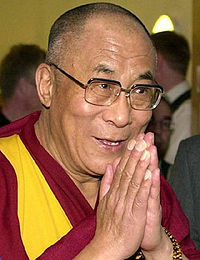
http://en.wikipedia.org/wiki/File:Tenzin_Gyatzo_foto_1.jpg
|
Brief Bio and Links |

Links: |
Jetsun Jamphel Ngawang Lobsang Yeshe Tenzin Gyatso (6 July 1935 in Qinghai),[1] is the 14th Dalai Lama.[2] He is the head of the Tibetan government-in-exile based in Dharamshala, India.[3] The Dalai Lama is a spiritual leader revered among Tibetans. The most influential figure of the Gelugpa or Yellow Hat Sect, he has considerable influence over the other sects of Tibetan Buddhism.[4] Tibetans traditionally believe him to be the reincarnation of his predecessors. The Dalai Lama was born fifth of 16 children to a farming family in the village of Taktser, Qinghai province, China.[1] His first language was the regional Amdo dialect.[5][6] He was proclaimed the tulku or rebirth of the thirteenth Dalai Lama at the age of two. At the age of fifteen, on 17 November 1950, one month after the Chinese army's invasion of Tibet, he was formally enthroned as Dalai Lama. He thus became the region's most important spiritual leader and political ruler. In 1959 the Dalai Lama fled through the mountains to India following a failed uprising and the effective collapse of the Tibetan resistance movement. He had at first, in 1951, ratified under military pressure a Seventeen Point Agreement to let his government to be a part of People's Republic of China. In India he set up a Tibetan government-in-exile. Among the 80,000 or so exiles that followed him Tenzin Gyatso strives to preserve traditional Tibetan education and culture.[7] The Chinese government, whose occupation of Tibet in 1959 forced him into exile, regards him as the symbol of an outmoded theocratic system.[8] A noted public speaker worldwide, the Dalai Lama is often described as charismatic.[5][9] He is the first Dalai Lama to travel to the West, where he seeks to spread Buddhist teachings and to promote ethics and interfaith harmony. In 1989 he was awarded the Nobel Peace Prize.[5][10] He was given honorary Canadian citizenship in 2006, and was awarded the United States Congressional Gold Medal on 17 October 2007.[11] The Dalai Lama has received more than 100 honorary conferments and major awards outside of Tibet.[12] On 17 December 2008, after months of speculation, he announced his semi-retirement. He said that the future course of the movement he had led for nearly five decades would now be decided by the elected parliament-in-exile under the prime minister Samdhong Rinpoche. The 73-year-old Nobel laureate, who had recently undergone surgery, told reporters in Dharamshala: "I have grown old.... It is better if I retire completely and get out of the way of the Tibetan movement."[13] |